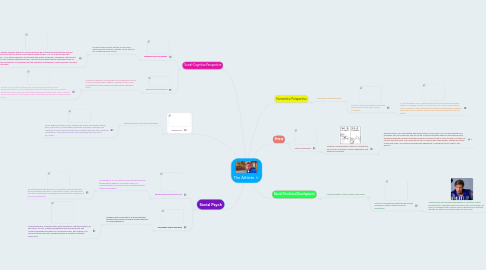
1. Ingroup Bias
1.1. The tendency to favor one's own group
1.1.1. At the beginning of the movie, Andrew and Claire are ignoring Bender, Brian, and Allison, not wanting to associate with them. Both him and Claire are "popular" and think that they are better than the other students in detention. "Your friends wouldn't mind because they look up to us."-Claire
2. Social-Cognitive Perspective
2.1. External Locus of Control
2.1.1. Someone who believes that his or her fate is determined by chance or outside forces that are out of their personal control.
2.1.1.1. Andrew, the athlete, believes that he is a winner because he is strong and fast naturally and did nothing himself to become a winner. This is shown when he says, "I'm not a winner because I wanna be one... I'm a winner because I got strength and speed. Kinda like a racehorse. That's about how involved I am in what's happening to me." This quote also shows that he feels that he has no control over his involvement in wrestling and that instead he is expected to and essentially forced to be a part of the team.
2.2. Reciprocal Determinism
2.2.1. A person's behavior is influenced by both personal factors and social environment. Behavior, personal factors, and environment all have reciprocal relationships with each other.
2.2.1.1. Andrew is strong and fast(personal factor) which is why he joined wrestling(behavior). At practice(environment) his teammates and coaches encourage him to work out more which makes him stronger and faster. These all affect each other and contribute to his committed involvement on the wrestling team.
3. Social Psych
3.1. Fundamental Attribution Error
3.1.1. The tendency for an observer, when interpreting and explaining the behavior of another person, to underestimate the situation and to overestimate the personal disposition
3.1.1.1. Andrew assumes that Bender is the way he is and acts the way he does that because he is a rude person overall, but he doesn't take into consideration his rough home life that can cause him to act in a rude manner.
3.2. Normative Social Influence
3.2.1. Influence and conformity to a group standard resulting from a person's desire to gain approval or avoid disapproval.
3.2.1.1. During detention, Andrew's peers were smoking in a different section of the library. At first, Andrew was hesitant about smoking and was trying to persuade the others to not smoke as well, but he gave in to social pressures and later joined the group in smoking so that he would fit in.
4. Stress
4.1. Type A Personality
4.1.1. Friedman and Rosenman's term for competitive, hard-driving, impatient, verbally aggressive, and anger-prone people.
4.1.1.1. Andrew Clark is very competitive and displays this in many ways. He is an avid wrestler and he always tries to be the best that he can be. Andrew shows this when he says that he has a wrestling meet the following Saturday and does not want to get in more trouble so it does not conflict with the meet. Also, when he got into a conflict with John Bender, Andrew was quick to become angry, and verbally and physically aggressive, causing him to pin John to the ground.
5. Social-Emotional Development
5.1. Marcia's Identity-Status Model: Foreclosure
5.1.1. The act of prematurely adopting the identity imposed by others without personal exploration.
5.1.1.1. Andrew Clark has accepted the identity of a wrestler simply because that is what has been imposed on him by his father. He hasn't considered other options before choosing to accept the identity his father and coaches have set up for him.
6. Humanistic Perspective
6.1. Conditional Positive Regard
6.1.1. Affection and valuing that is only given when a person lives up to certain conditions.
6.1.1.1. In "The Breakfast Club" Andrew's dad offers him conditional positive regard. He pushes Andrew to wrestle and "cut-loose" in high school. Thus, Andrew is a committed wrestler and tortured a weaker student in the locker room so that he would receive love and affection from his father.
